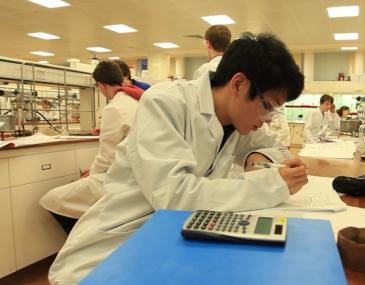This information is for applications with entry in 2024. Please check from end of May 2024 for updates to applications for entry in 2025.
Entry Details
- Typical intake per year: 2-3
- Typical offer: A*AA for A Level or 40-42 points with 776 at Higher Level for IB
- Required subjects: A Level/IB Higher Level Chemistry and one of A Level/IB Higher Level Biology, Mathematics or Physics
- Useful preparation: Most applicants for Veterinary Medicine at Cambridge have at least three science/mathematics A Levels or IB Higher Level subjects. Please note that 'science/mathematics’ refers to Biology, Chemistry, Physics and Mathematics. If you are taking Mathematics at IB Higher Level, we recommend Analysis and Approaches for the most competitive application, however Applications and Interpretations will also be considered.
- Admissions assessment: Yes, required at Queens' - a Pre-Registration Assessment
- Submitted work: No, not required at Queens'
Course Details
At Cambridge, you study the basic veterinary sciences first, before learning to apply that knowledge to veterinary practice as a clinical student. The first three years (pre-clinical studies) involve lectures, practical classes (including 120 hours of dissection across the three years) and supervisions, with typically 20-25 timetabled teaching hours each week. The clinical studies teaching is a mixture of lectures (in Years 4 and 5), practicals, group work in directed learning sessions, seminars, discussions and tutorials and a substantial element of practical clinical classes, together with a lecture-free final year (Year 6).
Information about the course structure, departmental teaching arrangements, offered topics and options can be found on the University of Cambridge website: Veterinary Medicine Course Outline
Veterinary Medicine at Queens’
Queens’ Vets are integrated into a thriving Medical and Veterinary community at the College. There are approximately 42 undergraduates studying pre-clinical (Years 1-3) Medicine or Veterinary Medicine and we maintain close ties with students in the clinical years (Years 4-6) as well. The student-run Medical and Veterinary Society (MedVetSoc, which celebrated its 90th birthday in 2017) fosters cohesion and friendship between students in the pre-clinical and clinical years. A primary aim of the Society is to widen the experience of the pre-clinical Medicine and Veterinary Medicine students by engaging with speakers from clinical and related disciplines, both within and outside of Cambridge. There are six to eight speaker events each academic year, with recent topics including ‘Evolution of Medical and Surgical Specialities’, ‘Postgraduate Medical Education’, and ‘The Coolness of Naked Mole-Rats’. There is also a wide range of social events, such as a start-of-year gathering, the annual MedVetSoc Dinner and the post-exam summer Garden Party. In addition, the Vetsoc encourages pre-clinical and clinical Veterinary Medicine students to socialise throughout term by arranging formals, brunches, punting trips and informal dinners in College.
Students in Years 2 and 3 of the course provide great support for the first-year students through the Student Contact scheme, which allows students in later years to advise and assist students throughout their first year and beyond. Between them, the Queens' Medicine and Veterinary Medicine students form one of the most coherent and cohesive groups within the College, while at the same time being individually involved in many aspects of the College's sporting, social and intellectual life.
Pre-clinical students are supervised in the main by Queens' Fellows, supported by dedicated Teaching Associates and Research Students. Together these form a loyal team who take great personal interest in the careers of each individual student.
Veterinary Medicine at Queens' is supported by the Barry Scott Fund for all academic costs and the Nightingale Fund for books, online subscriptions etc.
Gap years
A 'gap year' between school and university can provide wider life-experience and independence, which we consider to be valuable even if the time is spent doing non-veterinary related activities. We do not discriminate between those who have or have not taken a gap year.
Academic and Teaching Staff
 Dr Janet Maguire, see also Dr Janet Maguire | Department of Medicine
Dr Janet Maguire, see also Dr Janet Maguire | Department of Medicine
 Professor Clare Bryant, see also Professor Clare Bryant | Department of Veterinary Medicine
Professor Clare Bryant, see also Professor Clare Bryant | Department of Veterinary Medicine
 Dr Laurence Tiley, see also Dr Laurence Tiley | Department of Veterinary Medicine
Dr Laurence Tiley, see also Dr Laurence Tiley | Department of Veterinary Medicine
 Professor Stephen Price, see also Professor Stephen Price | Department of Clinical Neurosciences
Professor Stephen Price, see also Professor Stephen Price | Department of Clinical Neurosciences
Find out more
Open Days at Queens'
Department of Veterinary Medicine

